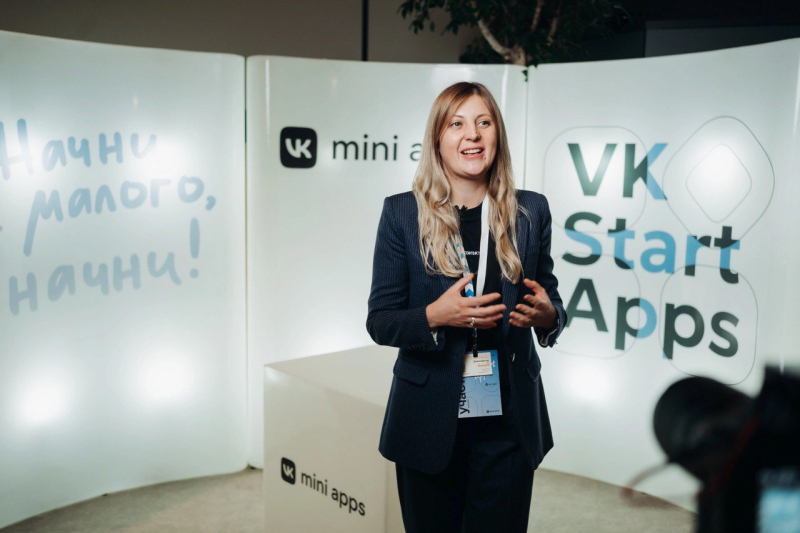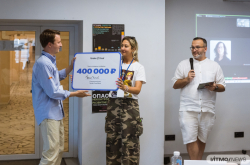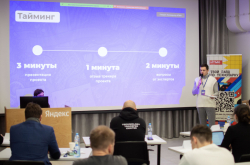Tell us about yourself. Where did you study and what did you do in life?
In five years, I got to study at three different universities: first, I learned Chinese in Vladivostok, then I studied PR, and eventually I graduated with a degree in marketing from the Economics Institute of Business (Moscow). Alongside my studies, I started working at 18 years old: I sold real estate in Dubai and rented out malls; then, I got a position at Knight Frank, one of the biggest real estate agencies. After that, I started my own agency.
Why did you decide to create a startup in another niche, far from real estate?
I got the idea in 2019 from my own experience: I was pregnant and I needed to take a special gymnastics course that wasn't available at the regular gym in my neighborhood. The classes that I needed were taught far from home: I had to commute there for an hour after work, exercise for an hour, and then spend another hour getting home. I decided that, for a pregnant woman, three hours, including two on public transport, was too much, so I started looking for alternatives – apps on the App Store. Back then, there weren’t many of those on the market, so I made up my mind to create my own app. The analytics that I checked showed that there was a growing market for technologies for women and there wasn’t any competition on the global scale – so that’s what I decided to do.
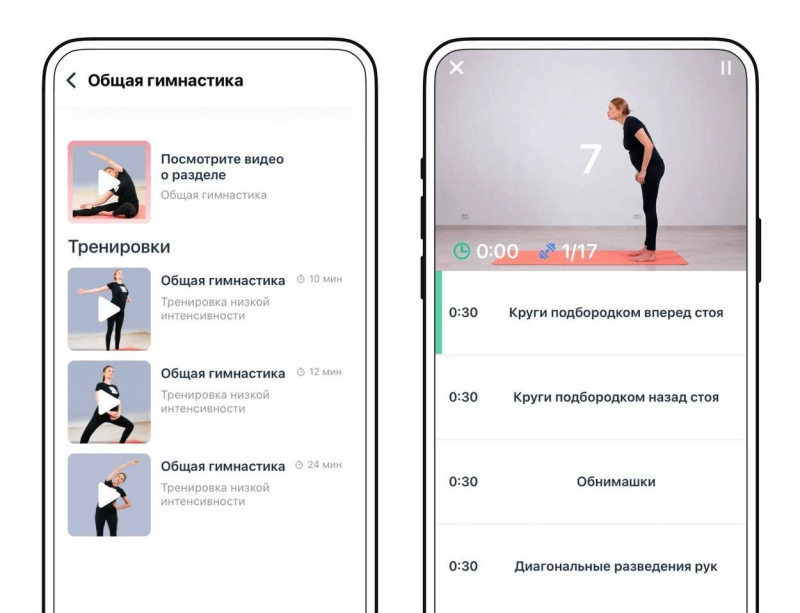
MotherFit. Image provided by Diana Duglas
What was your approach when you started making the app? How did you build up your team?
I had no prior experience in app development, so the only thing I could rely on were my management skills. That’s why I decided to assemble a team from scratch: I found the developers and an obstetrician, who would design the exercise routines; I also got a coach certificate myself to learn the basics – and the work began. At first, I outsourced employees, for which I had a budget of 1 million rubles.
To look for specialists, I turned both to job search engines, like HeadHunter, and to my personal network. Selecting the developers was hard, so I asked them to write a technical design specification to see how they felt about the project. All in all, I held around 30 interviews and two companies sent me design specifications; out of the two, I chose the one I started working with.
How is your app different from those of your competitors?
MotherFit is an app for pregnant women who want to do yoga, fitness, stretching, and special exercises. We are supported by the Russian Ministry of Health (we have a letter of recommendation from the Ministry’s office in the Vladimir Oblast) and the Russian Ministry of Sport: we won in a competition of mass sports projects in the category Transformation in Sports (IT) and in a startup contest in the category Personal Recommendation Systems In Sports. Whereas such apps are usually marketed as fitness apps, we emphasize our medical background: our exercise routines are approved by an obstetrician, we are supported by maternity wellness centers, as well as the regional perinatal center of the Vladimir Oblast. We were also among the finalists of the accelerator held by First Moscow State Medical University.
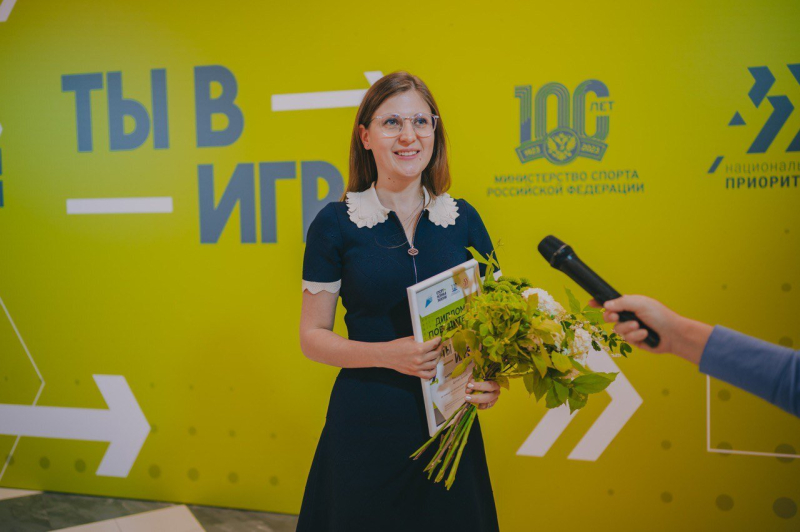
Diana Duglas at the awards ceremony of the Ministry of Sport competition. Photo by the competition's organizers, courtesy of Diana Duglas
What were the main difficulties you had to face when making your product? How did you overcome them?
The main problem was the lack of funding – we quickly ran out of money. It takes a lot of resources to develop an app and now I understand that it’s best to find a developer-cofounder from the start so that they can invest their work into development. The project would also benefit from their competencies and experience. After all, your team is the paramount factor in any endeavor, especially in a startup, where there is a lot of uncertainty.
We got through it last year, when we were joined by a cofounder, who has his own IT company with a team of 50 people – which also means development and competencies. Our team has now expanded to include 10 people. We have also won a grant from the Foundation for Assistance to Small Innovative Enterprises (within the Start-1 program), which really boosted our development process.
Apart from that, it’s important to test hypotheses, which takes time and money. It’s important to understand that the majority of your bright ideas will remain ideas and you need to be ready for that. It’s okay that you can’t do something on your first try – you should just keep on testing.
Last summer, you took part in ITMO Accelerator. How did you benefit from the program?
I came to ITMO Accelerator when I was looking for money and tech cofounders – at that point, the iOS app was almost ready. Though I haven’t found investments per se, I saw that my startup was on the right track. In Russia, it’s hard to find investors, so I took another approach: once I completed the program, I found a cofounder who would cover a part of the development costs; I also won the Start-1 grant of 4 million rubles. As of now, we have received 2 million, and we will receive the second half of the grant once we present the first part of our work. I won this grant only on my fourth try, when my application contained all my accelerator certificates, including the one from ITMO.
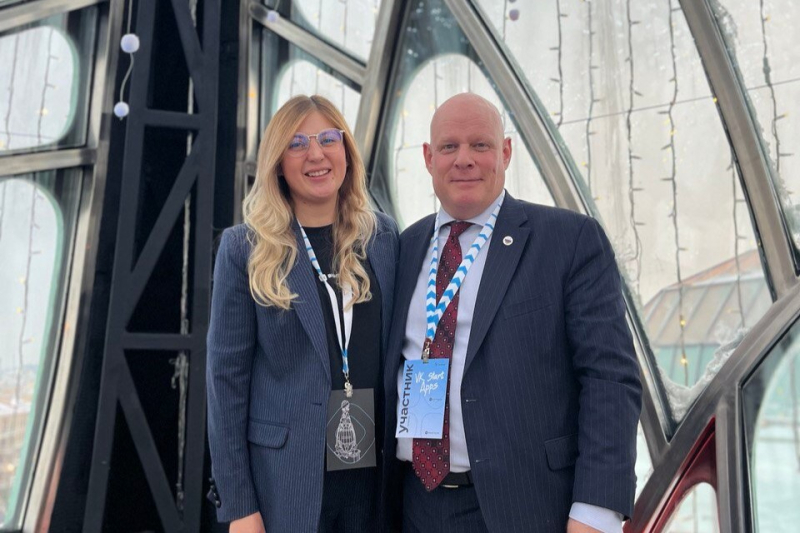
Diana Duglas with cofounder Nathan Hunt. Photo courtesy of Diana Duglas
What was your experience at the VK Start Apps accelerator?
I take part in a great number of competitions, accelerators, and any other activities to make a name for myself and find partners. I came across the VK Start Apps announcement in my inbox and decided to apply. Competition was tough: out of 320 teams that applied, only 50 were invited for an interview, and just 20 of those were selected to take part in the accelerator; and then, just 3, including us, were recommended for a Skolkovo grant of up to 7 million rubles. I am really grateful to my team for winning this. We will, of course, have to pass another test to actually receive this grant, but we consider our chances pretty high and are already counting on this money. As for now, we have to take part in the fast track, a special program that will help us get a Skolkovo residency more quickly.
During our three months at VK Start Apps, we were developing a mini app, discussing marketing, development, MVPs, and so on. At the end, we presented a completed app for the VK Mini Apps platform.
Thus, thanks to the accelerator we were able to enter a new platform: prior to this experience, none of us actually knew that VK Mini Apps existed. Now, we understand that it is beneficial to develop our product on other platforms, including VK, as the share of App Store users slowly declines (and the first version of our app was developed for iOS). In 2023, the total audience of VK Mini Apps was over 45 million users. It’s a great audience and a good market that we have to enter, as the competition is low there for now.
What are your current results?
We have launched our iOS app (we have over 30,000 downloads there) and our VK Mini app, where we have had around 3,000 unique users since December. At the moment, we are working on monetization: we already have revenue from ads and soon we will introduce subscription plans. Currently, our income doesn’t cover all our costs on salaries and other expenses – we are at the stage where we have only just attracted investments.
What are you going to do next?
We are planning to improve the VK app: fix bugs, add more exercise routines, and expand its functionality. By April, we want to launch the app for Android. Among our other plans is a global expansion of the app with new materials: something on psychology, something for fathers and kids, as well as information on preparing for childbirth and recovery – in other words, everything to engage our users’ interest for a long time. As a result, we will become a platform that supports the mental and physical health of every family member.
